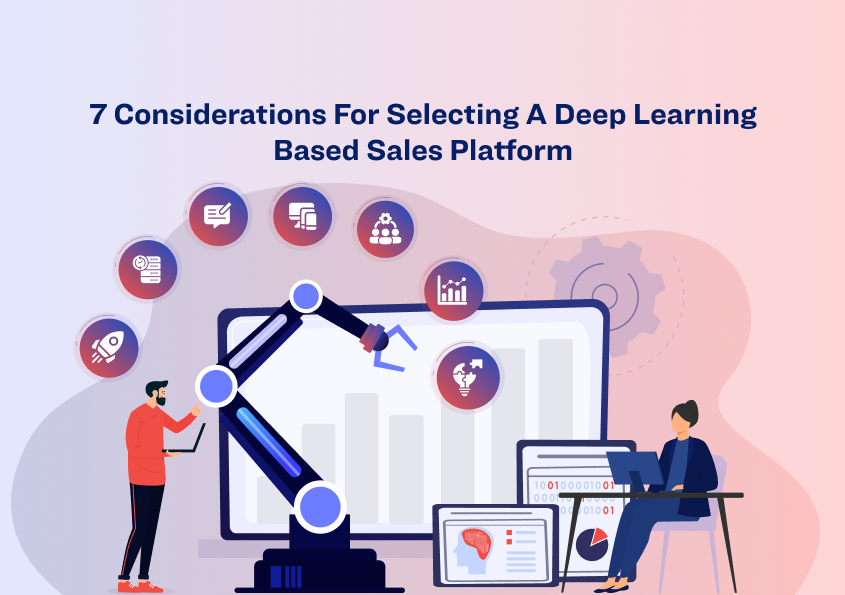As the business landscape continues to evolve, it's important for sales and revenue leaders to proactively address future challenges and drive growth. One way to stay ahead of the game is by utilizing solutions with advanced AI technology like deep learning (DL) to analyze massive amounts of data and make more informed, valuable decisions.
This blog is the third in our series on how deep learning is revolutionizing the world of sales.
In the first blog, we explored how deep learning can act as a crystal ball for sales teams, providing valuable insights and predictions to drive better decision-making and increase overall sales performance.
In the second blog, we delved into the ways in which deep learning is transforming conversational intelligence, allowing sales teams to better understand and respond to the needs of their customers.
In this third and final blog of the series, we'll be focusing on how to select sales technology with advanced AI based deep learning models that can maximize value for sales teams.
Benefits of Deep Learning Based Platform for Sales Teams
Using a sales platform with a deep learning model can be extremely beneficial in improving a sales team’s performance and efficiency. The primary goal of such a system is to provide the sales team with advanced AI insights and recommendations based on data analysis, which can help them make more informed decisions.
- Recommendations on upsell and cross-sell opportunities: One way a deep learning technology can benefit the sales team is by predicting which products or services are most likely to be successful. This can help the sales team focus their efforts on the products or services that are most likely to drive revenue, while also identifying potential upsell or cross-sell opportunities.
- Insights from sales interactions: Deep learning models could analyze data on customer interactions, such as email or phone conversations, to identify key points in the conversation that are most likely to lead to a sale. This can help the sales team identify when to close a sale and when to move on to the next opportunity.
- Guidance on seller coaching opportunities: Deep learning models can also help the sales team by providing real-time guidance and support during the sales process.
Selecting A Sales Platform With Deep Learning Models
It's important to note that for a deep learning based solution to be effective, sales and revenue leaders must understand the specific needs and goals of their sales team. The leaders should then work with IT leaders and data scientists to buy or build the system to address those needs effectively. Here are 7 key considerations for selecting a deep learning based sales platform that maximizes value for the sales teams.
1. Performance lift from advanced technology: Before implementing a deep learning system, it is important to compare its performance to that of traditional approaches, such as regression analysis, decision trees, etc. to see if it will provide a significant improvement. Advanced AI based deep learning systems are often able to achieve better performance than traditional approaches, particularly for tasks such as pattern recognition and predictive modeling. However, your data scientists should carefully evaluate the trade-offs between the benefits of deep learning and the cost and complexity of implementing and maintaining the system.
2. Data availability: One of the key considerations in designing or buying a deep learning based solution is the availability of relevant data. This includes both the volume and quality of the data, as well as the format in which it is stored. If the data is not sufficient or of good quality, it may not be possible to train an effective model. In such cases, it may be necessary to either collect more data or clean and pre-process the existing data to make it suitable for use. This may include leveraging open-source datasets or building custom datasets specific to the sales team's needs.
3. Feedback mechanism: It is important to have a mechanism in place for the sales team to provide feedback on the system and its performance. This can help to identify any issues or areas for improvement and ensure that the system is meeting the needs of the sales reps. This might involve gathering feedback through surveys, or by incorporating real-time data from the sales team's interactions with customers.
4. Compatibility with multiple devices: If you want your deep learning based solution to be used on various devices with limited processing power or storage capacities, such as smartphones or tablets, it may be necessary to use lightweight models. This may involve using techniques such as model compression or pruning to reduce the size of the model without sacrificing performance.
5. Computation resources: The computation resources required to train and run a deep learning system will depend on the complexity and size of the model, the amount of data needed to be processed, and the availability of the hardware and software infrastructure needed. It is important to consider these factors to ensure that the system can be run efficiently within those constraints.
6. Real-time vs. offline analysis: Another consideration is whether the deep learning system will be run in real-time or offline. Real-time analysis allows for more immediate insights, but may require more computation resources and may not be suitable for all use cases. Offline analysis may be more suitable for larger, more complex models that require more time to process. Real-time systems may be necessary for tasks such as providing recommendations to sales reps in the field, while offline systems may be sufficient for tasks such as analyzing past sales data to identify trends and patterns.
7. Tailored solution for customer-specific models: In some cases, it may be necessary to create customer-specific models to capture the unique characteristics or needs of individual customers. This can be done by training the model on data specific to each customer, or by using customer-specific features as input to the model.
Conclusion
The integration of an advanced AI technology like deep learning into sales platforms has the potential to greatly enhance the productivity and performance of sales teams. As sales and revenue leaders evaluate potential AI solutions, it is essential to consider factors that will maximize value for the team and the organization as a whole. A careful evaluation of these factors can help sales and revenue leaders make an informed decision and choose a platform that will drive the sales team’s productivity and performance, resulting in significant growth in sales and revenue for the organization.
Aviso leverages context-aware deep learning models to generate actionable insights that help sales teams better understand their customers and drive business outcomes.
Book a demo with Aviso to know more!

















 BY USECASES
BY USECASES
 BY CRM INTEGRATION
BY CRM INTEGRATION
 COMPARE
COMPARE















